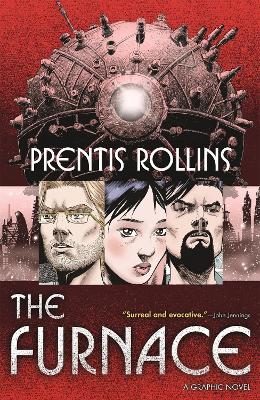Reviewed by Quirky Cat on
Brought to you from the mind of Prentis Rollins (Green Lantern: Rebirth, Villains United, Survival Machine) The Furnace is a graphic novel designed with the intent of making you stop and think. It’ll do everything to make you do that, even going so far as to hit you emotionally, to draw obvious lines from current situations to potential future ones.
The Furnace is described as being perfect for fans of Black Mirror and Twilight Zone and after having read it, I must agree with that assessment. It’s set in the future and questions the limitations and ethical use of technology. How far will humanity let it go? When exactly, does it cross a line? And how to we fix things, once that line is crossed?
The Furnace is anything but a light read, and yet it is so very much worth taking some time out of your day to read. Even if you don’t agree with the point it’s trying to make, or the methods it’s using, the fact of the matter is it will make you think. I personally adore food for thought books, and this one takes it a few steps further than that.
Yes, it can get a bit preachy at times, and I would sure hope that some of the scenario shown here would never actually happen - realistically I think it would actually cost more in the long run, so would never happen. But that’s a sad reason for me not believing it as a possibility, isn’t it?
While it does explore the line between technology being useful and overused, it also explores the human condition, in its own way. That’ll make more sense in a minute, I promise.
This book could easily have been called the Prisoner, if they had wanted to. A brief description of the major dilemma will make that clear; a new technology for keep tracking of prisoners is invented. While it will allow them to leave the prisons, move out into the real world, and go about their everyday life…it won’t let them be seen or heard, or interact with humans at all.
But I had to ask myself, while the idea of ‘freeing’ prisoners sounds great; it’s basically a pretty version of solitary confinement, isn’t it? When has solitary confinement ever been okay for every waking moment of a person’s life? Even the most hardened criminals don’t deserve that.
That’s what I was talking about earlier though – how would humanity react to an invention like that? To seeing it in use? And what about the humans inside it? Forever prevented from talking and being seen, from interacting with the world. They wouldn’t be able to free or kill themselves. In short, they’d be doomed to live out that sentence. Would everyone just sit by and watch? Simply because they can’t actually see it happening?
I love all the moral and ethical debates this book brought up. I’m going to have to make somebody else read it so I can chat with them about it. I think it could lead to a lot of interesting discussions, and again I believe that regardless of what side of the argument you take.
For more reviews, check out Quirky Cat's Fat Stacks
Reading updates
- Started reading
- 20 October, 2018: Finished reading
- 20 October, 2018: Reviewed
